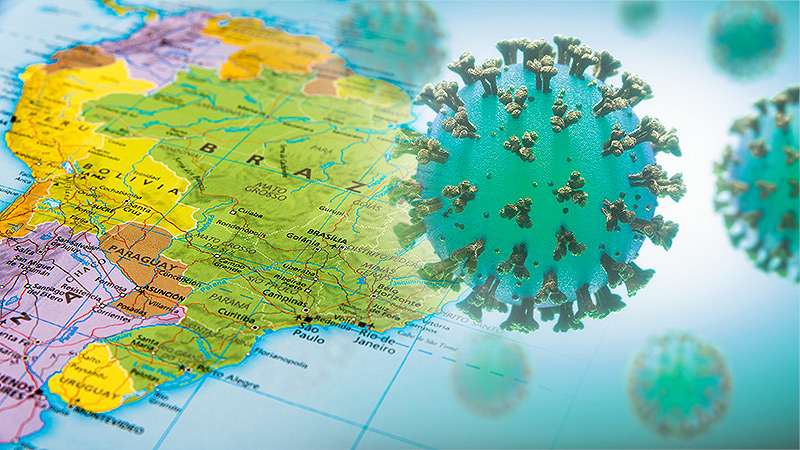RIO DE JANEIRO, BRAZIL – As more and more countries impose strict restrictions on freedom of movement in the fight against the coronavirus, as global travel comes to a halt and trade and investment collapse, economists are trying to assess the extent of the looming economic crisis.

Although the number of cases of Covid-19 in Latin American countries is still small compared to Europe and the USA, the global recession could impact the continent particularly hard.
Goldman Sachs analysts last week projected a 3.8 percent decline in regional economic output, significantly lowering their previous estimates.
British analysts also found that six Latin American countries are among the ten most vulnerable emerging markets: Bolivia, Peru, Costa Rica, Uruguay, Chile, and Brazil.
Although the population in Latin America is relatively young – only about eight percent are over 65 years of age and thus particularly at risk from Covid-19, compared with 18 percent in Europe – weak and underfinanced healthcare systems could collapse if the virus were to spread on a massive scale. In Guatemala, for instance, there are only 0.6 hospital beds per 1,000 inhabitants, in Cuba the figure is 5.2.
In most countries on the continent, this figure is between one and 2.5; in the USA it is 2.9, in Italy 3.4. The situation is similar for the number of doctors: With the exception of world leader Cuba (8.19), there are typically between one and three doctors for every 1,000 Latin Americans. The situation is particularly precarious in Haiti (0.24).
In addition, there are high inequality indicators in the region and the distinctive class-based nature of many health systems with private clinics of global standard for the upper class and an under-served majority.
A further cause for concern is the continent’s high national debt: among all the emerging markets, the economic heavyweights Brazil and Argentina have the highest public debt levels of all, with 92 and 93 percent of GDP, respectively.
Both countries also have high budget deficits and are particularly affected by the capital outflows in the wake of the crisis.
While the 2008/2009 financial crisis impacted Latin America relatively mildly, the limited fiscal leeway of many Latin American countries in the post-Coronavirus recession could cause major distortions. Financial analysts at Goldman Sachs last week announced that regional GDP had already dropped by 3.8 percent, compared to 2.1 percent in 2009.
This is compounded by the fact that most commodity prices have plummeted since the outbreak of the pandemic: The price of crude oil, on whose exports Venezuela, Colombia, and Ecuador, in particular, are heavily dependent, has dropped by 66 percent in the past 12 months; but the prices of gas (-44 percent) and copper (-25 percent) are also in the red, which will cause difficulties in Bolivia and Chile in particular.
Another sector in crisis is tourism, which has almost come to a complete halt and is the most important economic factor in many Caribbean states.
Fifty-five percent of the region’s workforce is employed in the casual sector, and most of them are not covered by social security systems. In Honduras, for instance, hunger riots and looting have already occurred due to the initial restrictions, which result in the complete loss of income for the vast majority of society.
In the context of urgently needed investment in public health and economic stabilization, left-wing politicians and economists as well as social movements in Latin America recently called for comprehensive debt relief.
The International Monetary Fund also attracted criticism. Although it set up an emergency fund worth billions, it refused to grant a loan to crisis-ridden Venezuela for political reasons.
The role of the IMF in fighting the Coronavirus crisis also needs to be challenged in light of the disreputable structural adjustment measures in the region. Corresponding cutbacks led to the dismissal of 2,500 health care professionals in Ecuador in 2019.
However, in view of the spread of the virus, the IMF has now urged all countries to sharply increase their health care spending.

